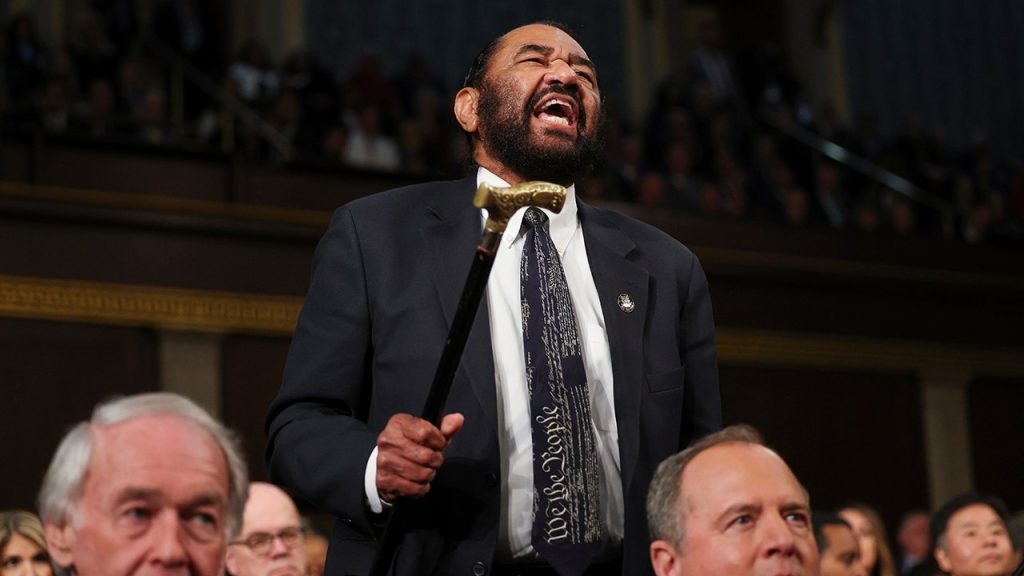In a recent political incident, President Donald Trump condemned Democratic Representative Al Green for interrupting his address during a joint session of Congress. Triggered by Green’s outburst, which drew bipartisan censure from the House, Trump suggested that Green should undergo an IQ test, labeling him as a “low IQ individual.” This remark reflects the heightened tensions that often accompany political speeches in the current volatile landscape of Congressional discourse.
| Article Subheadings |
|---|
| 1) Overview of the Incident |
| 2) President Trump’s Response |
| 3) Congressional Reaction |
| 4) Historical Context of Congressional Conduct |
| 5) Future Implications for Congressional Decorum |
Overview of the Incident
The incident involving Al Green, a Democratic Representative from Texas, took place on March 4, 2025, during President Trump’s address to a joint session of Congress. As Trump delivered his remarks, which highlighted Republican successes in recent elections, Green disrupted him with loud interjections, insisting, “You have no mandate!” His outburst was not just an isolated event but a culmination of mounting tensions related to party divisions and frequent interruptions seen in Congressional settings. The House of Representatives swiftly addressed Green’s behavior by voting to censure him, marking an unusual but significant institutional response to actions deemed unacceptable during a formal proceeding.
President Trump’s Response
In an exclusive interview following the incident, President Trump issued a scathing criticism of Green’s conduct and intellect. “He should be forced to pass an IQ test because he is a low IQ individual, and we don’t need low IQ individuals in Congress,” Trump said, underscoring his disdain for Green’s actions during the session. Additionally, he referred to Green as “a fool and a clown,” expressing that such behavior was not merely embarrassing for Green himself but for the Democratic Party as a whole. Trump’s remarks reflect a broader strategy of challenging opponents directly and painting them as inadequate or unfit for their roles, a hallmark of his communication style.
Congressional Reaction
The bipartisan censure of Al Green signifies the House’s commitment to maintaining order and decorum, even amidst partisan disputes. House Speaker Mike Johnson played a pivotal role in ensuring Green’s removal, highlighting the seriousness with which the House approached the disruption. This action sends a clear message that there are consequences for actions that disrupt legislative proceedings. The response from both sides of the aisle suggests a recognition of the need for respect and civility in high-stakes political environments. Members of both parties, while ideologically diverse, seem united in valuing the integrity of Congressional functions, especially in a time rife with divisive rhetoric and partisan hostility.
Historical Context of Congressional Conduct
The incident involving Green is not the first instance of disorder within the halls of Congress. Historically, there have been numerous occasions where lawmakers have responded emotionally during speeches and debates, but formal reprimands are less common. Past instances include the infamous caning of Senator Charles Sumner in 1856 or widely narrated outbursts during politically charged moments in more recent history. Understanding this context enriches the current interpretation of congressional decorum. The censure of Green may be viewed as part of a broader endeavor to reclaim civility in governance, which has seemingly diminished in the wake of increasing polarization and the normalization of aggressive tactics in political disagreements.
Future Implications for Congressional Decorum
The repercussions following the interruption of President Trump’s address extend beyond the immediate effects on Green’s reputation. They may pave the way for stricter adherence to rules of decorum in Congress. Lawmakers might face greater scrutiny over their conduct, pushing them to navigate legislative discussions with more decorum and respect. The dynamics within Congress are likely to evolve as representatives consider the consequences of disruptive behavior; this may lead to greater efforts in fostering a culture of constructive dialogue. Long-term, the incident could signal shifts in how Congress operates, promoting a more disciplined legislative environment that emphasizes civil discourse, even as political divides remain deep and complex.
| No. | Key Points |
|---|---|
| 1 | President Trump criticized Rep. Al Green for his disruptive behavior during a joint address. |
| 2 | The House of Representatives censured Green for interrupting the President, marking a significant bipartisan action. |
| 3 | Trump’s comments included calling Green a “low IQ individual,” reflecting ongoing partisan tensions. |
| 4 | The incident has raised discussions about the need for civility and decorum in Congressional conduct. |
| 5 | Future implications may include stricter enforcement of respect and decorum amongst Congressional members. |
Summary
The recent episode involving Rep. Al Green during President Trump’s speech underscores a pivotal moment in how Congress handles decorum amidst rising tensions. The bipartisan censure reflects an institutional commitment to maintaining order in legislative processes. This incident may serve as a catalyst for a broader movement toward improved civility in political discourse, shaping the future dynamics of Congressional interactions, fostering an environment where respectful dialogue can prevail, even amidst political disagreements.
Frequently Asked Questions
Question: Why was Rep. Al Green censured by Congress?
Rep. Al Green was censured by Congress for interrupting President Trump’s address during a joint session, which was deemed as an unacceptable breach of decorum during a formal proceeding.
Question: What did President Trump say about Al Green’s intelligence?
President Trump referred to Al Green as a “low IQ individual,” suggesting that he should be forced to pass an IQ test, in response to Green’s disruptive behavior during the address.
Question: How does this incident relate to historical Congressional conduct?
The incident involving Rep. Al Green highlights ongoing challenges related to decorum within Congress, similar to previous historical disruptions, indicating a need for civil discourse among lawmakers and the importance of maintaining institutional respect.


